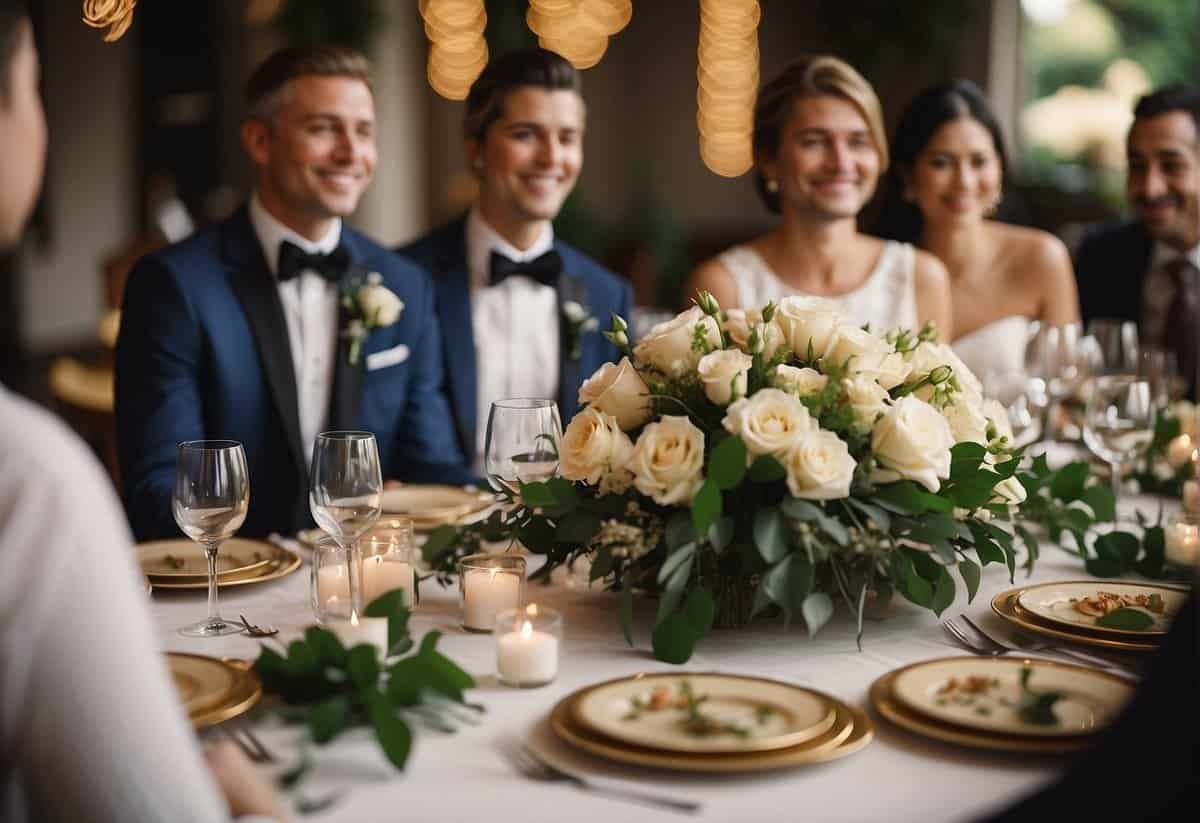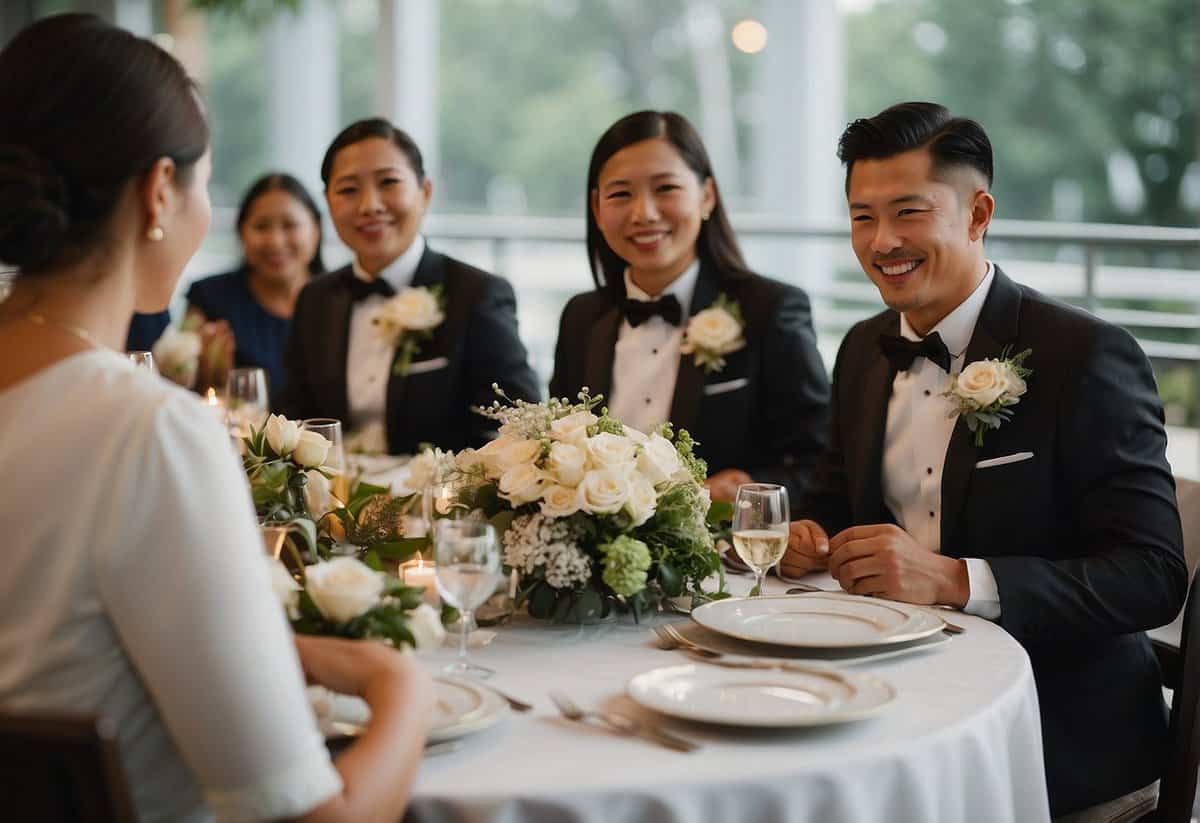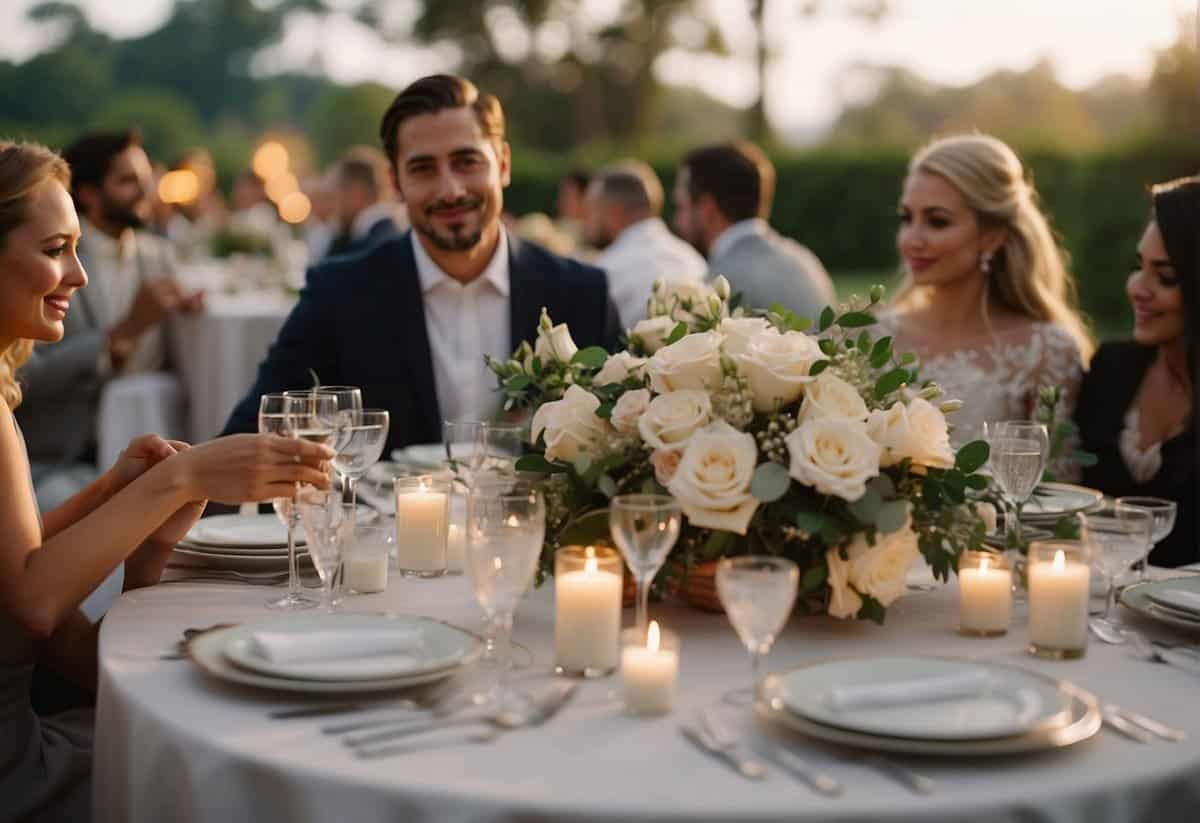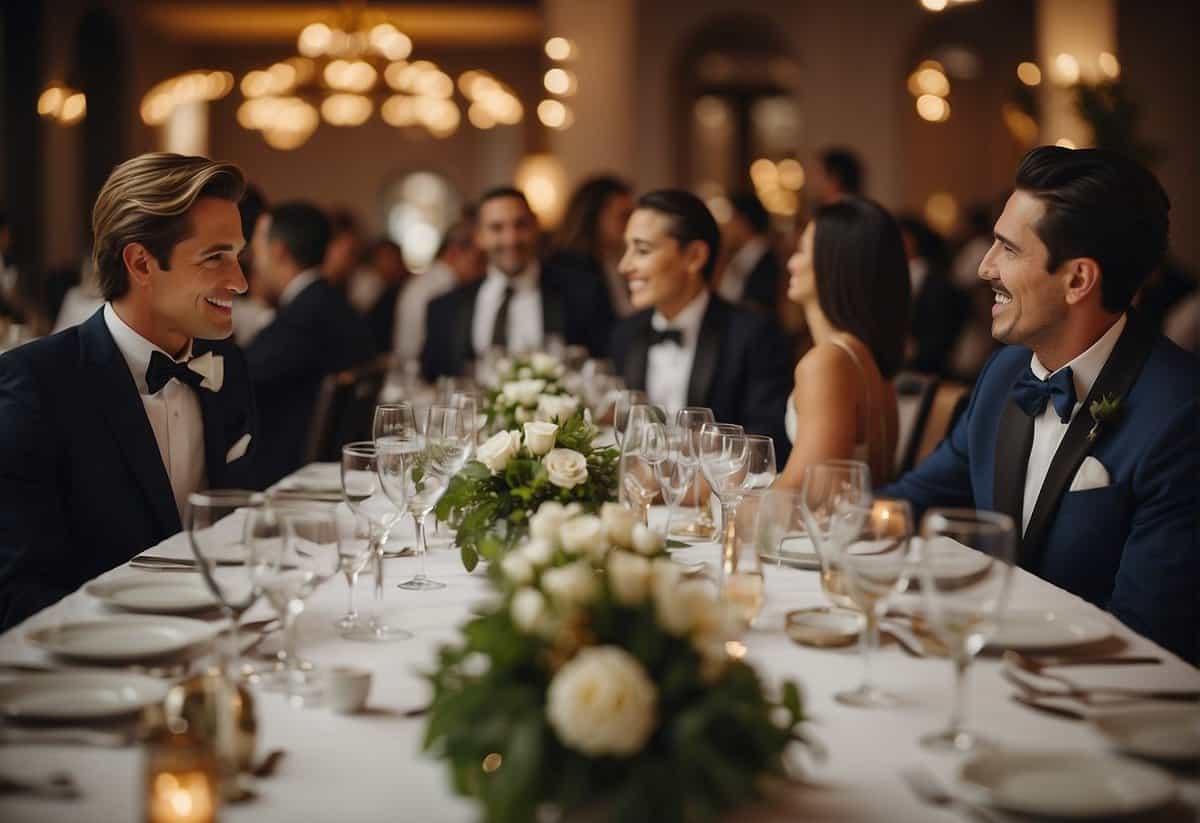Who Typically Pays for the Groom’s Dinner? Unraveling Wedding Etiquette
When it comes to the days leading up to a wedding, the groom’s dinner, also known as the rehearsal dinner, is a significant event that traditionally marks the beginning of the wedding festivities. It’s an occasion for the couple’s closest friends and family to gather, often after the wedding rehearsal, for a meal and to enjoy each other’s company before the big day. Wedding etiquette has long held that the groom’s family is responsible for the cost of this event, offering a chance for them to play a distinct role in the celebration of the marriage.

The landscape of wedding finances, however, is shifting. While the groom’s family typically takes care of the rehearsal dinner, it is not uncommon nowadays for the couple to contribute to or even handle the expenses themselves, reflecting a more modern approach to wedding planning. What’s important is that the event encapsulates the spirit of unity and celebration, regardless of who pays. By understanding the traditions and opening up to contemporary practices, you can navigate the financial aspects of your wedding with grace and ease.
Key Takeaways
- The groom’s dinner is traditionally financed by the groom’s family.
- Modern practices often see the couple contributing to the rehearsal dinner costs.
- The focus of wedding expenses is to honor unity and celebration.
Understanding Wedding Expenses

When you’re planning a wedding, it’s crucial to have a clear picture of your wedding budget. Typically, various expenses are shared between the bride and groom’s families, and understanding who pays for what can help alleviate financial stress.
Bride’s Family Contributions
Traditionally, the bride’s family takes on a significant portion of the wedding expenses, sometimes covering costs such as:
- Venue for ceremony and reception
- Bride’s attire and accessories
- Photography and videography services
- Catering for the reception
Groom’s Family Contributions
On the other hand, the groom’s family often contributes to specific aspects, with their main responsibility being the rehearsal dinner. This event is usually less formal than the wedding reception and can vary in style and size.
- Rehearsal dinner
- Marriage license and officiant fees
- Honeymoon planning and costs
What the Couple Covers
Increasingly, the couple themselves may elect to bear parts of the wedding costs, showing their independence and direct financial contribution to their big day.
- Wedding bands and the engagement ring
- Personal flowers like bridal bouquet and groomsmen boutonnieres
- Gifts for the wedding party and each other
Extended Family and Friends
Sometimes, family members and friends may also express the desire to contribute. This can take many forms, ranging from monetary assistance to handling specific planning elements like music or decorations.
Remember, while these roles are part of wedding planning traditions, there’s a lot of flexibility nowadays. Families and couples are free to discuss and decide how best to allocate the costs, ensuring that planning a wedding remains a shared, joyful experience for everyone involved.
Specifics of the Groom’s Dinner

When planning the groom’s dinner, often referred to as the rehearsal dinner, you’ll want to consider who traditionally foots the bill. Historically, the groom’s family, more specifically the groom’s parents, are responsible for the costs associated with this meal.
The evening’s venue can vary from formal banquet halls to casual backyard barbecues, and it’s an opportunity for the groom to spend time with his groomsmen and close family before the big day. It’s common for the groom’s family to pick a location that reflects their taste or perhaps a favorite family spot.
Regarding the menu, food and alcohol choices should cater to the guests’ preferences and can range from multi-course meals to simple, hearty fare. Remember, the style of the groom’s dinner can be less formal than the reception, so you have flexibility in your choices.
When it comes to groomsmen gifts, this dinner is an ideal time for the groom to express gratitude to his party with thoughtful tokens of appreciation. These gifts can be handed out during the dinner as a personal gesture.
As for the groom’s attire for the evening, it should be suitable for the venue’s atmosphere while also aligning with the dinner’s level of formality.
In modern times, the who pays for what can vary and often the cost is shared among the groom’s family, the bride’s family, and sometimes even the couple themselves. It’s key to have open and clear communication early on to set expectations and budgets.
Remember, while tradition suggests the groom’s parents are typically responsible for the groom’s dinner, your personal situation and preferences should guide your final decision.
Other Wedding Contributions

When planning your wedding, you’ll find that costs are often divided among the couple and their families, with each responsible for different aspects. Here’s a breakdown of typical contributions beyond the groom’s dinner.
Bride’s Family Responsibilities
The bride’s family traditionally assumes a significant role in covering wedding costs. Key expenses typically include:
- Ceremony: Your parents may pay for venue fees, decoration, and music.
- Attire: They often purchase the bride’s wedding gown and sometimes contribute to other attire expenses.
- Honeymoon: While less common, some bride’s parents may choose to gift the honeymoon as a grand gesture.
- Wedding Ring: They occasionally help with the cost of the bride’s engagement and wedding rings.
Cost Sharing and Gift Contributions
Wedding expenses can also be shared more broadly:
- Registry: You and your partner might set up a registry for wedding gifts, allowing guests to contribute to your new life together.
- Gift Contributions: Close friends and family often opt to give monetary gifts to help with wedding expenses in lieu of traditional presents.
- Attire: It’s not unusual for relatives or godparents to offer to buy specific items, such as the veil or shoes.
Remember, every family situation is different, and these traditions are evolving. The most important thing is to communicate openly about who is comfortable paying for what and to proceed in a way that suits everyone involved.
Additional Considerations for Guests and Bridal Party

When you’re part of the bridal party or a guest at the groom’s dinner, a few key considerations will ensure you’re well-prepared for the event:
Attire: Usually, the rehearsal dinner is less formal than the wedding. Dress nicely, but there’s often no need for full formal wear unless specified.
Travel: If you’re traveling from out of town, you might want to coordinate with others to share accommodation or transport costs. It can make the trip more fun and less expensive.
Accommodations: Check if the couple has reserved a hotel block with discounted rates. Book early to avoid last-minute rushes.
Invitations: These are typically less formal than wedding invitations and may come via email or a phone call. Ensure you RSVP promptly.
For the Wedding Party:
Gifts: While not always necessary, it’s a kind gesture to bring a thoughtful gift for the couple, even if just a handwritten note of congratulations.
Bridal Party Roles: The maid of honor and best man may be responsible for toasts. Prepare a few words in case it’s expected.
Guest List: It might be a more intimate affair, so understanding the guest list context is important. It’s a time to mingle with close family and fellow wedding party members.
Remember to approach all these details with a spirit of compromise and cheer. The focus is on celebrating with the couple!
Frequently Asked Questions

Navigating wedding finances can be complex. Here’s some helpful information about the groom’s family‘s financial responsibilities, specifically about the rehearsal dinner.
What are the typical responsibilities of the groom’s family in wedding finances?
Traditionally, the groom’s family is responsible for specific expenses, such as the rehearsal dinner, the groom’s attire, and often the honeymoon.
What customs guide who should finance the rehearsal dinner?
The rehearsal dinner is traditionally financed by the groom’s family, though modern practices allow for a variety of arrangements, including the couple or bride’s family contributing.
How is the cost of a wedding’s rehearsal dinner usually divided between families?
While the groom’s family often covers the rehearsal dinner, there’s no fixed rule; the costs can also be divided among the families or even shared with the couple themselves.
What expenses should the groom’s parents expect to cover?
The groom’s parents should expect to pay for the rehearsal dinner, the groom’s wedding day attire, and potentially contribute to the honeymoon.
In the case of divorced parents, how is payment for the rehearsal dinner commonly handled?
When parents are divorced, the responsibility may still fall on the groom’s side, but often, the costs will be split in a way that’s comfortable for all parties involved.
Are there any etiquette guidelines for funding the groom’s dinner?
Yes, there are etiquette guidelines, but they are flexible. Key is communication amongst those involved to decide who is comfortable paying for what. Etiquette often takes a backseat to practicality and personal preference when planning who pays for the groom’s dinner.

